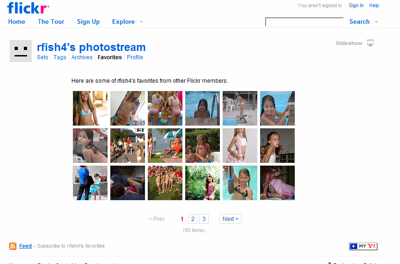The latest Edtech Posse podcast is up (thanks Rob). This was a conversation recorded last night with Dean Shareski, Richard Schwier, Rob Wall and myself (and a special, mystery presenter!) regarding my latest Flickr Perversion post, balancing openness, Wikipedia, milli-Dunbars, 2009/365, and building social networks. It was a fun conversation (as usual) and we hope you’ll have a listen.
Tag Archives: perversion
Flickr Perversion
Yesterday, I received an email notice saying that a few of my Flickr photos had been favorited. These particular photos were of my children, mostly of my daughter. Every time this happens, I go to see who the Flickr user is, and most of the time, it is a family member, a close friend, or someone I know through Twitter (or other social network). I did not recognize the user in this particular case, and when I went to see their photos, the Flickr message alerted me that none of the user’s photos were available. Seeing as my photos had been favorited, I went to see what other photos had been marked as favorites by this user.
My jaw dropped to the floor.
What I saw was three pages of favorited photos of preteen girls, most shots in bathing suits or with little clothing. Had I viewed any of these photos individually, isolated from the others, I am sure that this same feeling of disgust would not have come over me. But these photos, viewed together, favorited by some anonymous user, told a very different story. These photos of these girls were without a doubt being sexualized, and my four-year-old daughter was amongst these images.
Note: The images I include below are the actual screenshots. My daughter does not appear in these images, and she was the only girl in these photos that was well clothed. I have included these screenshots because I think it is important to get a sense of what happened here. However, I have significantly reduced the size of this image for (hopefully) obvious reasons.
These photos are legal. The actions of the user who favorited these is also legal (although incredibly disgusting). I did not want photos of my child to appear here. So, this is what I did:
1) Blocked the user. This means my photos would no longer appear in the list. However, if your photos are viewable to the public, this means they can still be viewed, just not favorited.
2) Contacted Flickr: I reported this user, and within a couple of hours, the user was taken down.
End of story? Nope.
I get another email, telling me that more of my daughter’s photos had been favorited. Same story. I check out the user, no photos, but many favorites. It gets worse.
This time, there were four pages of girls favorited by this user. The girls were a bit older, but in the majority of the photos, the subjects were handcuffed, often in sexually provocative poses. Again, my daughter’s photos appeared. I blocked the user, contacted Flickr. Same deal. But obviously, that’s not enough.
I admit, I live my life (in the) Open. I have been lucky that I have never had to block a person from Facebook, Twitter, Flickr, etc., before this time. Sure, there has been the odd griefer here and there, but usually, these problems resolve themselves if you deal with them appropriately, or in some cases, ignore them. My belief is that in all aspects of life, we should not have to live our lives in fear. I’m an idealist. I believe in the power of good people, and I have been lucky enough to have been surrounded by good people in both my temporal and virtual realities.
But these types of incidents shake up everything one believes. So now, rather than provide answers, I want to provide some questions for anyone willing to respond. Here are some of my questions.
1) What must parents know about the realities of the Internet in regards to how we deal with the photos (and identities) of our children?
2) What are the benefits of an open vs. a closed reality? Are the benefits of openness (e.g., in regards to our families) worth the risks? And, what are the credible risks?
3) What precautions should we take, or perhaps, what precautions do you take in the presentation/development of your family’s digital identity?
4) What rights and responsibilities do we have as parents to protect the digital identities of our children?
5) How do we proceed from here? How do we help other parents to understand these important issues?
I’d love to hear from you. While openness will be a continued theme in my educational life, I continue to rethink these philosophies on the most personal of levels. It is also my belief in openness that guides me in telling this story. I believe that we need to face these issues head on, inform others, raise awareness, and work to solve these problems together.



